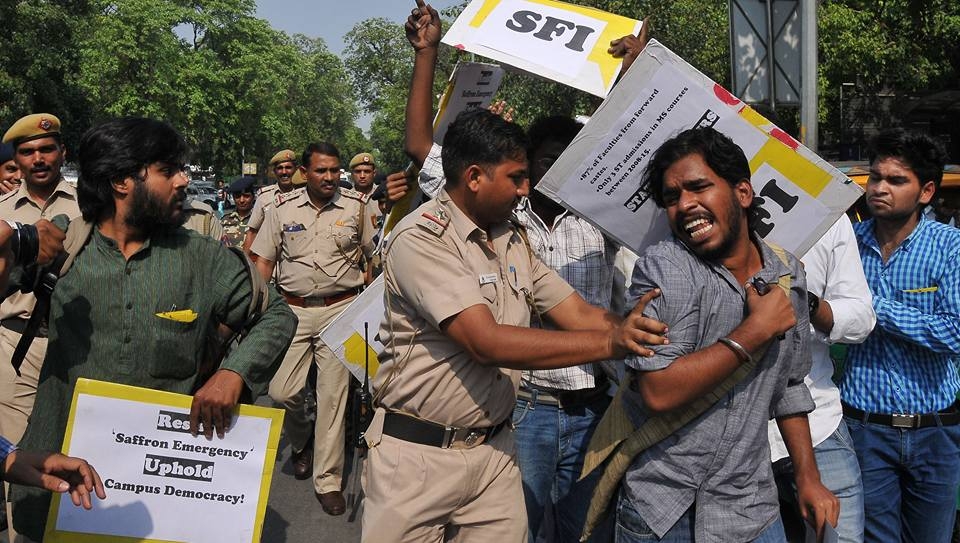
Sunand
THE de-recognition of the Ambedkar-Periyar Study Circle (APSC) in IIT-Madras at the behest of the HRD ministry invited reactions from various sections. The central executive committee (CEC) of the SFI had given a call to form Ambedkar-Periyar Forums on campuses across the country not only in solidarity with the friends in IIT-Madras, but also against the casteist-brahmanical regressive ideology of the Sangh Parivar. The very idea behind this call was not to launch permanent study circles, but to give a strong message to the RSS-BJP that no authoritarian attack on freedom of expression will be tolerated. The blooming of such forums, even though some were limited only to the social media, is a reflection of the deep discontent among wide sections of youth, after just a year of the Modi regime. It was after such wide protests that the IIT-Madras administration was forced to withdraw the de-recognition order.
As per the call of the CEC, a programme was organised right at the gates of the HRD ministry in Delhi. This programme in Delhi met with heavy police repression. Students marched towards the gate with photos of Ambedkar, Periyar and Bhagat Singh in their hands and slogan of ‘Phule, Ambedkar, Bhagat Singh, We shall fight, we shall Win!’ on their lips. A few minutes after the forum was inaugurated, the students who had gathered peacefully were assaulted and pushed into a police van. They were detained at Parliament Street police station for several hours. All India president of SFI V Sivadasan and joint secretary Vikram Singh were among those detained.
The entire episode betrayed the deep anxiety of the central government on this issue. The de-recognition of APSC is a reflection of the Hindutva fascistic powers’ attempts to curb democratic voices, and brought to light the deeply undemocratic nature of the so-called guidelines in several such institutes which deny students the basic fundamental rights of freedom of speech and freedom of association. Campus democracy is something that has been absent in many of our top notch institutes and even the most democratic rights are denied to students.
The entire episode saw reactions from forces with diverse political views, but as far as the democratic students’ movement and SFI are concerned it has brought to fore certain basic points which need to be highlighted. Firstly, the names of social reformers like Ambedkar and Periyar can’t be left only for various caste based groups. Both of them, along with scores of other social reformers, continue to hold relevance for all democratic forces which “strive to eradicate…all forms of social oppression and fight for the abolition of caste system”. Personalities like Karl Marx, Bhagat Singh, Ambedkar and Periyar continue to hold relevance even today because of the deep and penetrative analysis which they made of the inequalities existing during their times. This deep sense of angst against the inequality is what unites these historical personalities, in spite of the differences in their views, conclusions and approach. Secondly, the entire episode is intrinsically linked to caste based discrimination and inequalities in our higher educational institutions. Role of democratic students’ movement then doesn’t end with the withdrawal of the de-recognition order of APSC. In fact, the real task in front of us is to make concrete interventions and mobilise students from these socio-economically deprived sections behind the united banner of democratic students’ movement. Thirdly, our higher educational institutions and university centres are not isolated from the phenomena of rise in identity based groups, which seek to divide the people’s struggles on the basis of myriad forms of identities. These groups in general have been showing antipathy towards the Left-led democratic students’ movement. They often behave as if fighting for the oppressed castes and groups is their monopoly. At a time when we are witnessing an escalated neoliberal offensive at all levels and in all spheres of education which are going to further restrict the access to education and employment, the challenge becomes even bigger. The task of building effective resistance to these offensives will also require unity among the student community. This necessitates raising the specific issues of the students from socio-economically deprived backgrounds on one hand and the ideological struggle against the sectarian, identity groups on the other.
The current issue of RSS mouthpiece Organiser has made a tirade against the students’ protests in the aftermath of the APSC issue, which is only a pointer to the deep ideological struggle involved. RSS sees these protests as attempts to “mask nationalist reformer like Ambedkar within the Communist garb of class division”. Apart from the routine lies and misrepresentations which have been part of the RSS’ agenda of appropriating Ambedkar, the most important political point in the Organiser editorial is the declaration that ‘All Indians, irrespective of their caste and religion have common heritage. Hence, instead of following the path of divisive ideologies, we need to establish a process of dialogue to create an atmosphere of social harmony and learn to march together as a nation’. The lead article in the same issue, titled ‘Poisoning Young Minds’, accuses the Left-led student movements of creating divisions and enmity on campuses. With scores of ‘glorious’ incidents like the murder of Prof. Sabbharwal in Ujjain illuminating the history of RSS’ student wing ABVP, the concrete facts speak for themselves, but the manner in which RSS has reacted to the current episode is a reflection of the unease with the possibilities of socio-economically deprived sections of students rallying behind a united banner of ‘Education for all, and Jobs for all’.


